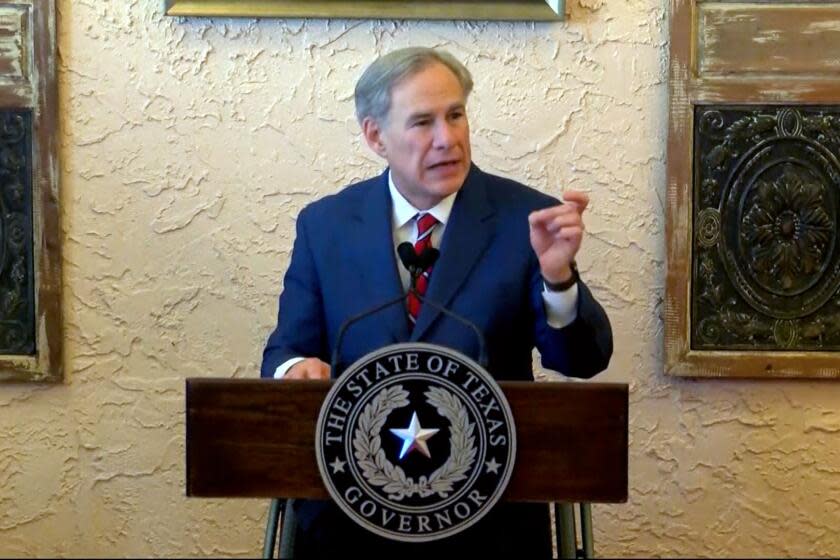Editorial: Texas Gov. Greg Abbott's pardon of man who killed protester undermines trust in the justice system

The American criminal justice system is decidedly imperfect. But despite a history of unfair convictions and acquittals rooted in racism and social and financial inequity, it has long been respected above its counterparts in more authoritarian nations for at least aspiring to even-handed treatment of the accused.
Its goal is to absolve the innocent and punish the guilty regardless of which party or person holds political power. Confidence in American democracy rests in part on belief in the integrity and independence of the justice system.
Texas Gov. Greg Abbott’s May 16 pardon of convicted murderer Daniel Perry threatens that confidence.
Read more: Editorial: As he leaves office, Trump abuses the pardon power — again
Perry was a 30-year-old U.S. Army sergeant and Uber driver angry over the protests that followed the May 25, 2020, police murder of George Floyd in Minneapolis. He was stationed at Fort Hood, Texas — since renamed Fort Cavazos as part of a string of base renamings to remove connections with Confederate or racist leaders.
On July 25 of that year, Perry ran a red light and drove into a street protest in Austin, about 70 miles from his base.
He was confronted by demonstrators, including Air Force veteran Garrett Foster, 28, who held a military-style rifle, as is permitted under Texas open-carry laws.
Read more: Editorial: Trump’s vow to pardon Jan. 6 insurrectionists is itself an attack on the rule of law
Foster motioned to Perry to roll down his window. Witness testimony and Perry’s own statements reveal that Foster did not point the gun at him. But Perry said he wasn’t going to give Foster the chance to do so.
“I believe he was going to aim it at me,” Perry said in a police interview. “I didn’t want to give him a chance to aim it at me, you know.”
So Perry shot Foster with a handgun.
Was it self defense? A Texas jury determined it was not, and found Perry guilty of murder. He was sentenced to 25 years in prison.
Read more: Editorial: Trump is politicizing (and personalizing) the pardon process
But right-wing commentators, including Tucker Carlson, and politicos who have no business butting into jury verdicts, immediately began pressing Abbott for a pardon because they wanted to push back against Black Lives Matter and the raucous and occasionally violent protests the organization inspired in the latter half of 2020.
In Texas, a governor may only grant a pardon if a seven-member Board of Pardons and Paroles recommends one. But the governor appoints the members, who granted Abbott’s request. Abbott in turn granted the pardon Thursday, and Perry was immediately set free and his gun rights restored.
Pardons are a sort of relief valve, useful when the criminal justice system follows the letter of the law but nevertheless results in an injustice given the particular circumstances of the crime or the offender. But they can easily be abused by leaders to shield their supporters from accountability while leaving political opponents to suffer the full consequences of their crimes.
Read more: Editorial: On brand, Trump throws America's reputation in the trash to wink at war crimes
The most glaring examples in recent memory may be Donald Trump’s pardons of political allies and members of his campaign team, including Paul Manafort, Michael Flynn, Roger Stone and Steve Bannon. Trump has vowed to pardon rioters convicted in the Jan. 6, 2021, attack on the Capitol who were intent on blocking certification of Joe Biden’s election victory. And he has promised to use the Justice Department to pursue charges against his political enemies, including Biden, if he is elected in November.
Abbott’s pardon of Perry is not directly self-serving in the same sense, but it permits him to substitute his own judgment for that reached by the court system, and elevates his beliefs over the findings of a jury.
By way of explanation, Abbott released a statement that “Texas has one of the strongest ‘stand your ground’ laws of self defense that cannot be nullified by a jury or a progressive district attorney.”
But the jury did not nullify anything. Its task was to wade through the evidence and determine the facts, including whether Foster aimed his gun at Perry and, if not, he could be deemed such an immediate threat as to justify Perry shooting him. Given that Perry himself acknowledged that Foster didn’t aim at him, there’s little room for doubt. Abbott’s pardon, together with Texas’ ill-considered gun laws, could easily escalate any argument into a shooting.
And it could transform any criminal proceeding into a political battle. Abbott has repeatedly asserted his unhappiness with Black Lives Matter protesters. Texans are unlikely to believe that Abbott would have similarly pardoned Foster if he had shot Perry, for fear that Perry might shoot him first without aiming at him.
That leaves people with the nagging thought that the U.S. criminal justice system will treat people differently based on who they are and who they're allied with. That's not new, and the protests in the wake of the Floyd killing remind us we still have far to go to eliminate race, politics and other inappropriate factors from the system. As much of the nation works to diminish those things, though, it is confronted by political moves such as Abbott's, which push in the other direction.
This story originally appeared in Los Angeles Times.

